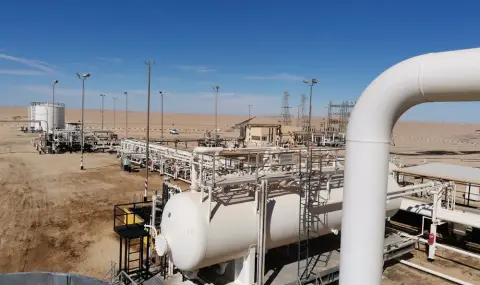Since the beginning of the week, several important oil fields in Libya have been shut down and the country's oil exports have gradually declined. This leads to an increase, albeit moderate, in the prices of black gold on world exchanges. Reuters explains the causes of the oil crisis in the country, BTA reported.
How did it get here?
Since the start of the Western-backed uprising in 2011 that ousted longtime dictator Muammar Gaddafi, access to oil revenues has been a major goal of the country's political factions and armed groups. In the years that followed, both small local groups and large national organizations often "turned the tap" in an attempt to get a bigger share of the revenue or political concessions. Libya is currently divided into two - eastern and western - as a result of the failed peace process that followed the civil war that broke out after 2011. Both parts have their own governments.
In 2020, a ceasefire was reached following a failed attempt by the eastern government to capture Tripoli and the subsequent establishment in December 2021 of a government of national unity under the leadership of Abdulhamid al-Dbeyba and with the support of the West.
Unification of the country was never achieved, however, and the two sides continued to fight, albeit at a low intensity. Among the main points of conflict is access to government revenue, this time the issue stemming from the battle for control of the country's central bank. The government in Tripoli is trying to replace the governor of the bank, Sadiq ak Kabir, while the one in Benghazi is firmly behind him.
Who Blocked Libyan Oil Fields?
During most of Kabir's 13-year tenure at the helm, eastern factions have tried to oust him, backed an alternative top banker and even briefly created their own central bank. But now they are standing behind him and insisting that he remain in his post.
Last week, the parliament speaker, who is based in Benghazi, said the oil would stop flowing if Kabir was replaced. Since Sunday, the country's oil fields, located mainly in its eastern part, have become subject to gradual occupation by protest groups.
Soon after, the parliament announced that Libya could not produce or export oil because of the protests that had begun. Military commander Khalifa Haftar, who backs the eastern government and controls oil fields in the east, has described attempts to replace Kabir as illegitimate. According to analysts, in recent months the two have developed a mutually beneficial relationship
What are the requests?
The eastern factions have only one demand - that Kabir be reinstated. Behind this lies the ongoing battle for revenues from energy exports.
In the last major clash since 2022, Prime Minister Dbeiba managed to replace longtime National Oil Corporation chief Mustafa Sanala with Farhat Bengdara, who is believed to be close to Haftar, however. This led to the creation of a kind of "alliance of common interest" between Dbeiba and Haftar and a division of oil revenues between the east and the west of the country. But with the conflict between Kabir and Dbeiba, a new opportunity for confrontation opened up.
Is there any prospect of a deal?
So far, no one seems inclined to back down. Eastern factions believe that by cutting funds to the central government and questioning the legitimacy of the central bank, Tripoli will be forced to back down.
The central bank is the only legal center that deals with oil revenues and pays the salaries of civil servants across the country. If these functions are called into question, Libyans will feel difficulties. However, they will affect both the east and the west of the country, which gives trump cards in Tripoli's hand as well.
How long can the blockade last?
The oil blockade has been a well-known tactic in Libya's chaotic political scene since the ouster of Gaddafi in 2011. Blockades organized by small local groups were often resolved within days, but large blockades linked to large political or military groups often they lasted for months. The blockade of the wells organized by Haftar in 2020 lasted the longest - a whole eight months, and it came to a halt only after his attempt to take control of Tripoli failed.
